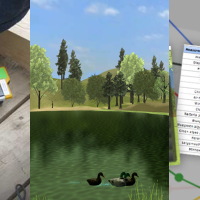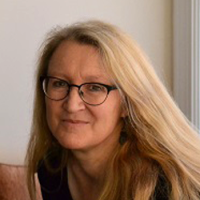Summary of Projects
The EcoLEARN Projects are the result of a collaborative effort between Tina Grotzer’s lab at on causal learning and Chris Dede’s lab on virtual reality. Together, they have worked on four projects as described below: EcoMOD, EcoXPT, EcoMOBILE, and EcoMUVE. These projects use advanced immersive technologies to support learning about the complex causal dynamics of ecosystems. A separate website for the projects can be found
here.
EcoMOD
The EcoMOD (Model/Modify, Observe, Design) project will explore the power of immersive virtual environments to support computational thinking and ecosystem science learning in elementary grades. Research shows that, with appropriate scaffolding, even young students can begin building complex causal concepts and understandings of systems dynamics. Developing more advanced scientific and computational thinking in later grades depends on creating a strong foundation in elementary school. However, important questions remain unanswered about how young learners think about models. EcoMOD engages learners in observation and exploration of a complex systems model based on a simulated forest building upon assets developed in an earlier project called EcoMUVE. EcoMOD’s learning goals, related to ecosystem science topics like food webs, will be taught using a systems perspective, and will shift the focus from comprehension of static representations to student interaction with dynamic computational models. Students will explore model elements through a programming sandbox, and will see the effects as they modify the properties and behaviors of the system through programming. EcoMOD will link multiple representations to help connect visual models to dynamic representations of ecosystem relationships. The curriculum will provide a highly supported, object-oriented programming environment customized to focus on ecosystems modeling and designed specifically for younger children.
EcoXPT
EcoXPT is a Multi-User Virtual Environment or MUVE, where students explore a virtual representation of a pond ecosystem to understand ecosystems and causal dynamics, based on an earlier program called EcoMUVE. EcoXPT goes beyond observational inquiry to engage students with experiment-based inquiry as practiced by ecosystems scientists and called for in the Next Generation Science Standards (NGSS). Interviews with ecosystem scientists informed the development of EcoXPT so that students can authentically test their own hypotheses so as to better understand causal patterns they could previously only observe, thereby extending their comprehension of underlying causal relationships. Through lab-based (such as comparison and tolerance tanks) and in-world experiments (such as tracers and mescosms), students manipulate variables that represent the complex causal connections between ecosystem components and develop a concept map of their causal explanation. The team is running classroom-based studies in a diverse set of schools to demonstrate the effectiveness of the curriculum and the learning gains that students achieve.
EcoMOBILE
EcoMOBILE (Ecosystems Mobile Outdoor Blended Immersive Learning Environment) is an extension of an earlier project called EcoMUVE and the resulting curriculum, developed at the Harvard Graduate School of Education with funding from the Institute of Education Sciences. In EcoMUVE, students explore a virtual representation of a pond ecosystem. In EcoMobile, funded by the National Science Foundation and Qualcomm's Wireless Reach initiative, students will use the EcoMUVE software and also extend their learning with mobile technologies through one or more field trips to a local pond environment. Two forms of technology for science education will enhance their experience in the real world.
EcoMUVE
Ecosystems science, an important strand of the life science content standards, requires an understanding of complex causal relationships. However, even after instruction, students often retain inaccurate interpretations about ecosystems’ structural patterns and systemic causality. With the research team of colleague Chris Dede, an expert in virtual worlds, we developed a Multi-User Virtual Environment (MUVE)-based ecosystems science curriculum called EcoMUVE to address these problems. EcoMUVE includes two ecosystems science curricular modules for teaching various aspects of ecosystems science. These MUVE modules are to complement and extend the current curriculum of the Understandings of Consequence Project’s Causal Patterns in Ecosystems curriculum.
The EcoMOD, EcoXPT, and EcoMOBILE have been supported by the National Science Foundation (grant # DRL1639545 to Chris Dede, Tina Grotzer, and Karen Brennan; DRL1416781 to Tina Grotzer and Chris Dede; and DrK121118530 to Chris Dede and Tina Grotzer). The EcoMUVE project was supported by the Institute for Education Sciences (grant # #R305A080514). All opinions, findings, conclusions or recommendations expressed are those of the authors and do not necessarily reflect the views of the National Science Foundation or the Institute for Ecosystem Studies.





-
-
-
-
-
-
Support PZ's Reach